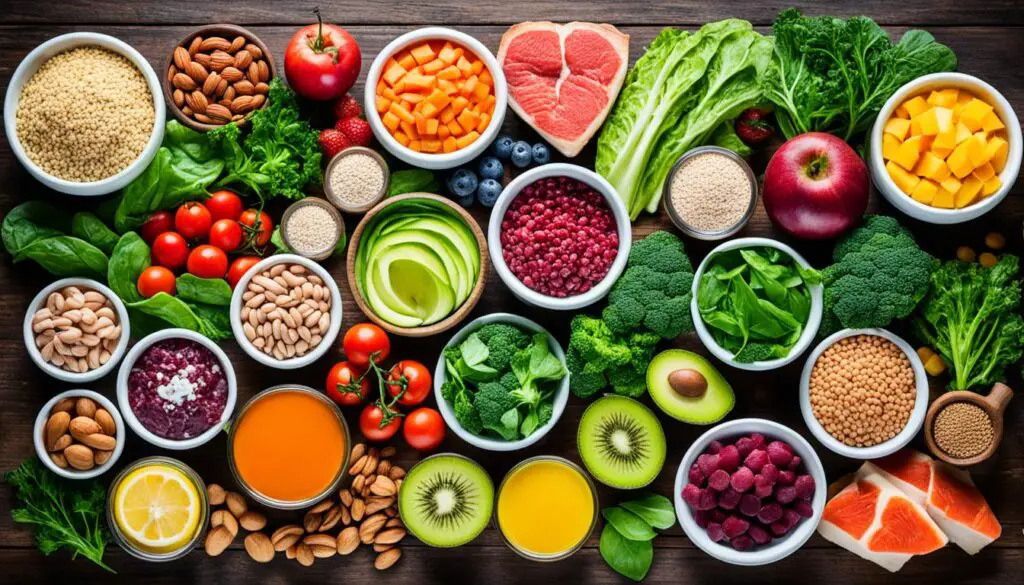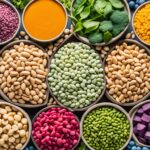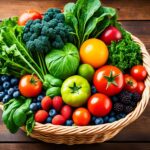Do you often grab a quick breakfast but feel hungry a few hours later? Protein might be the key to feeling full and energized. It’s crucial for your health, helping with muscle repair and keeping your immune system strong.
Imagine making it easy to add high-quality protein to your meals and snacks. This could boost your energy and support your body’s needs. Let’s explore the top 10 protein-rich foods that can improve your nutrition and energy levels.
Key Takeaways
- Protein is essential for supporting muscle growth, immune function, and overall health.
- The recommended daily protein intake is 0.8-1 gram per kilogram of body weight.
- Incorporating a variety of protein-rich foods, including both animal and plant-based sources, can help you meet your daily needs.
- Lean meats, fish, eggs, dairy, legumes, and whole grains are all excellent protein-rich options.
- Protein supplements can be a convenient way to boost your intake, but should be used in moderation and as part of a balanced diet.
Importance of Protein in Your Diet
Protein is key for your health and well-being. It’s found in many foods and is needed by every cell in your body. This includes muscles, bones, skin, and hair. If you want to lose weight, protein is great because it takes a long time to digest. This makes you feel full longer and might help you snack less.
Protein’s Role in Health and Well-being
Getting enough protein has many benefits. It helps keep your muscles strong, aids in recovery, and can help with weight control by making you feel full. Protein is also important for growing and fixing tissues, making enzymes and hormones, and keeping your immune system healthy.
How Much Protein Do You Need?
Most adults need about 0.8 grams of protein per kilogram of body weight. For a 150-pound person, that’s around 55 grams of protein a day. But, your protein needs can change based on your age, how active you are, and your health goals. It’s best to get 10-35% of your daily calories from protein.
| Body Weight | Recommended Protein Intake |
|---|---|
| 140 pounds | 50 grams per day |
| 200 pounds | 70 grams per day |
It’s important to eat a mix of high-quality protein sources to meet your body’s needs. This supports your health and well-being.
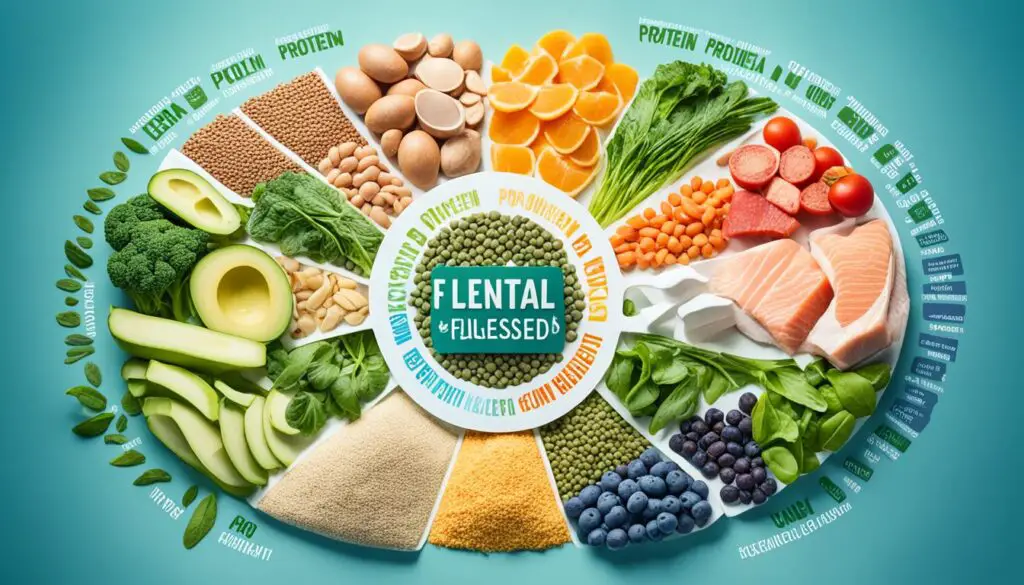
“Eating protein is important for muscle recovery and strength following resistance training.”
Animal-Based Protein Sources
Animal-based foods are great for getting high-quality protein. They have all the amino acids your body needs, making them easy to use. Let’s look at some top animal-based proteins that can increase your daily protein.
Salmon: A Nutritional Powerhouse
Salmon is a top choice for animal protein. Just 3 ounces gives you 21.6 grams of protein. It’s also full of omega-3 fatty acids, vitamins, and minerals like vitamin B12, phosphorus, and selenium.
Greek Yogurt: Creamy and Protein-Packed
Greek yogurt is another great protein choice. A 7-ounce serving has almost 20 grams of protein. It’s also full of calcium, probiotics, and B vitamins for your health.
Lean Chicken Breast: A Versatile Option
Lean chicken breast is key in many high-protein diets. A 4-ounce serving has about 24 grams of protein. It’s also packed with phosphorus, vitamin B6, and selenium for your meals.
Adding these animal-based proteins to your diet helps you get enough protein. It supports muscle growth and gives you important nutrients. Don’t forget to mix in plant-based proteins for a balanced diet.
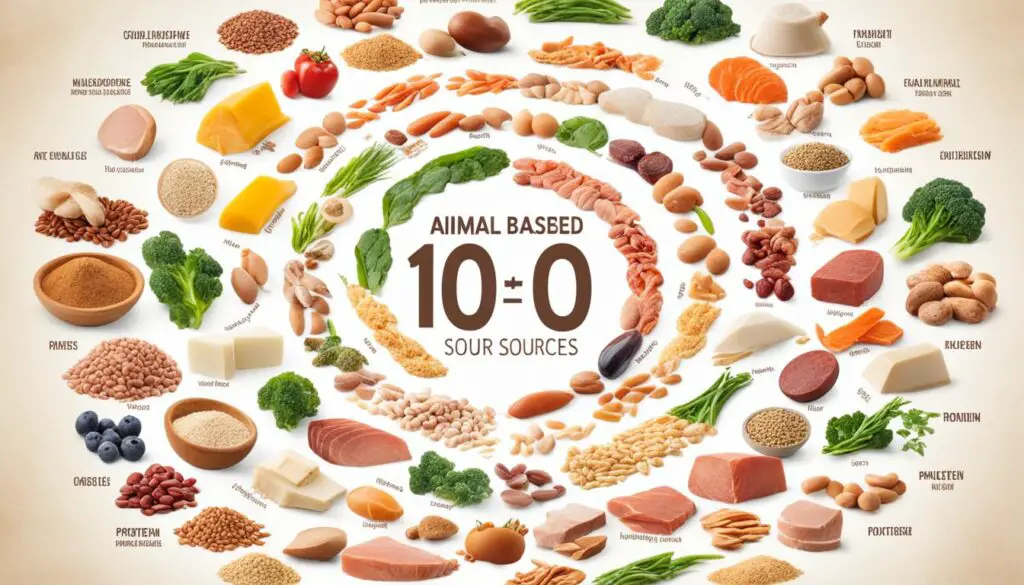
Top 10 Protein Source
Protein is key for our health and well-being. There are many great sources of protein, both from animals and plants. Let’s look at the top 10 foods that are rich in protein.
- Salmon – Salmon is a top choice for protein and omega-3 fatty acids. A 3-ounce cooked salmon has about 22.5 grams of protein.
- Greek Yogurt – Greek yogurt is creamy and full of protein. A 7-ounce container has 20 grams of protein.
- Lean Chicken Breast – Chicken breast is a great protein source. A 3-ounce piece has 26.5 grams of protein.
- Lentils – Lentils are a great vegan option for protein. A cooked cup has 18 grams of protein.
- Garbanzo Beans (Chickpeas) – Chickpeas are another plant-based protein choice. A cup of cooked chickpeas has 14.5 grams of protein.
- Eggs – Eggs are full of protein. A large egg has 5-8 grams of protein, depending on its size.
- Tempeh – Tempeh is a fermented soy product with 15.5 grams of protein per 1/2 cup.
- Quinoa – Quinoa is called a “superfood” because it’s a complete protein grain. A cooked cup has 8 grams of protein.
- Cottage Cheese – Cottage cheese is a great dairy product for protein. It has 14 grams per 4-ounce serving.
- Pork Tenderloin – Pork tenderloin is lean and has 22 grams of protein per 3-ounce serving.
The Recommended Dietary Allowance (RDA) for protein is 0.8 grams per kilogram of body weight per day for healthy adults. Adding these top 10 protein-rich foods to your diet can help you meet your protein needs. This supports your overall health and wellness.
These top protein sources are great for athletes, health lovers, or anyone wanting a balanced diet. They provide the fuel your body needs to do well. Try these high-protein foods to help you reach your nutrition goals.
Plant-Based Protein Powerhouses
Many plant-based foods are great for protein, but vegan and vegetarian diets need careful planning. Luckily, there are many plant-based protein options to help you get enough protein.
Lentils: A Nutritious Vegan Protein Source
Lentils are a top plant-based protein choice, with 18 grams of protein per cup. They’re also full of fiber, complex carbs, and important vitamins and minerals. Adding lentils to your meals is a smart way to increase your vegan protein intake.
Quinoa: A Complete Protein Grain
Quinoa is a top plant-based protein source, with over 8 grams of protein per cup. It’s special because it’s a complete protein, meaning it has all nine essential amino acids our bodies need. This makes quinoa a great vegetarian protein choice for a plant-based diet.
By choosing nutrient-rich vegan protein sources like lentils and quinoa, you can make sure your body gets enough plant-based protein. Adding these strong vegetarian protein options to your meals is an easy way to increase your protein and support your health.
Incorporating More Protein Into Your Diet
There are many tasty and healthy ways to get more protein without just eating meat. If you want to build muscle, manage your weight, or just feel better, eating more protein can really help.
Protein Supplements: Pros and Cons
Protein supplements can be a good option if you’re not getting enough protein from food. You can add protein powder to smoothies, baked goods, or even drink it with water or milk. One scoop of whey protein powder can provide around 17 grams of protein, which is a big help.
But remember, supplements shouldn’t replace real food in your diet. Protein-rich foods like lean meats, eggs, dairy, legumes, and nuts give you more vitamins, minerals, and nutrients your body needs. Just use supplements wisely and in moderation.
- Protein supplements can be a convenient way to increase your protein intake, especially for those with busy lives or dietary restrictions.
- Look for high-quality, trusted brands and be mindful of the serving size and overall nutrient profile of the supplement.
- Pair protein supplements with a balanced, whole-food diet to ensure you’re meeting your nutritional needs from a variety of sources.
Whether you want to eat more protein, try plant-based proteins, or add protein supplements to your diet, focus on eating a balanced diet. Making smart choices and paying attention to your protein intake can improve your health and help you reach your fitness goals.
Conclusion
Getting enough protein intake is key for good health and wellness. Adding different types of high-quality protein to your meals helps your body. This supports your immune system, muscle growth, and blood sugar control. You can choose from lean meats, seafood, dairy, legumes, or supplements to meet your protein needs.
Strength and power athletes need about 1.4 to 1.8 grams of protein per kilogram of body weight daily. Endurance athletes should aim for 1.2 to 1.4 grams. For regular adults, 0.8 grams per kilogram is enough. But older adults need 1.2 grams per kilogram.
Eating a mix of protein-rich foods like lean meats, seafood, dairy, legumes, and plant-based options is good. Foods like lentils and quinoa provide the amino acids your body needs. A balanced diet with plenty of protein is great for your health and well-being.

